10 conclusions from the 2022 Tour of Flanders
Fans return, Jumbo and Trek miss moves in women's contest, Van der Poel writes unexpected script, and more observations from the cobbles
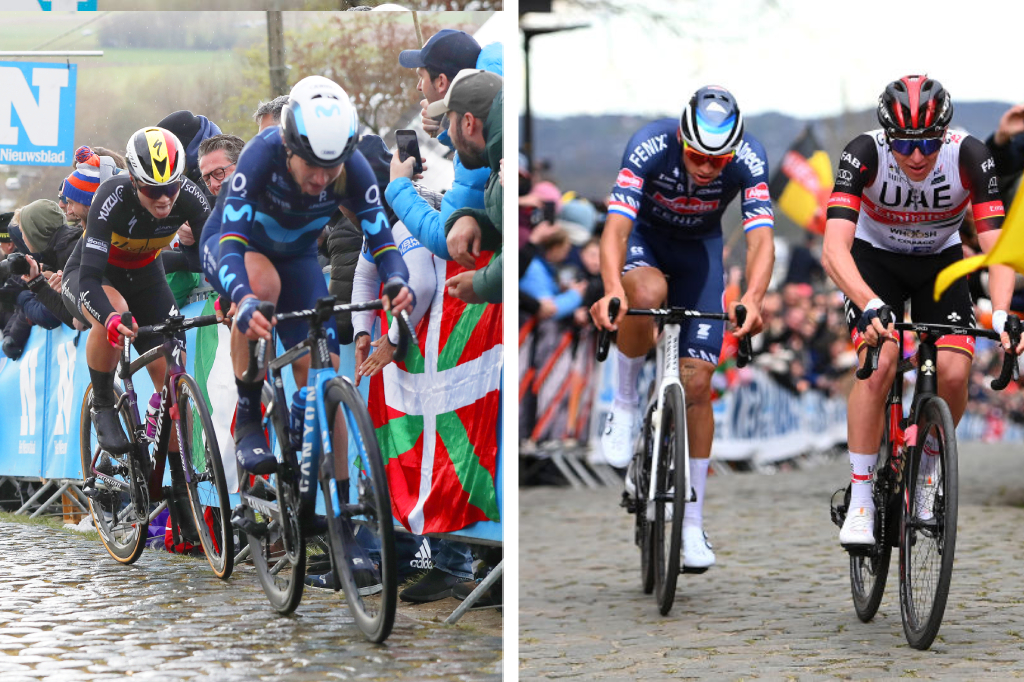
The Tour of Flanders men's and women's events drew to a close on Sunday with two remarkable victories, one from Mathieu van der Poel (Alpecin-Fenix) and the other from Lotte Kopecky (SD Worx).
The races ended in spectacular fashion, for different reasons, enrapturing the huge crowds that came out to enjoy the spectacle that is the De Ronde, having been absent due to COVID-19 health restrictions for the previous two editions.
Cyclingnews highlights the key takeaways from the men's and women's Tour of Flanders.
Pogacar is human after all
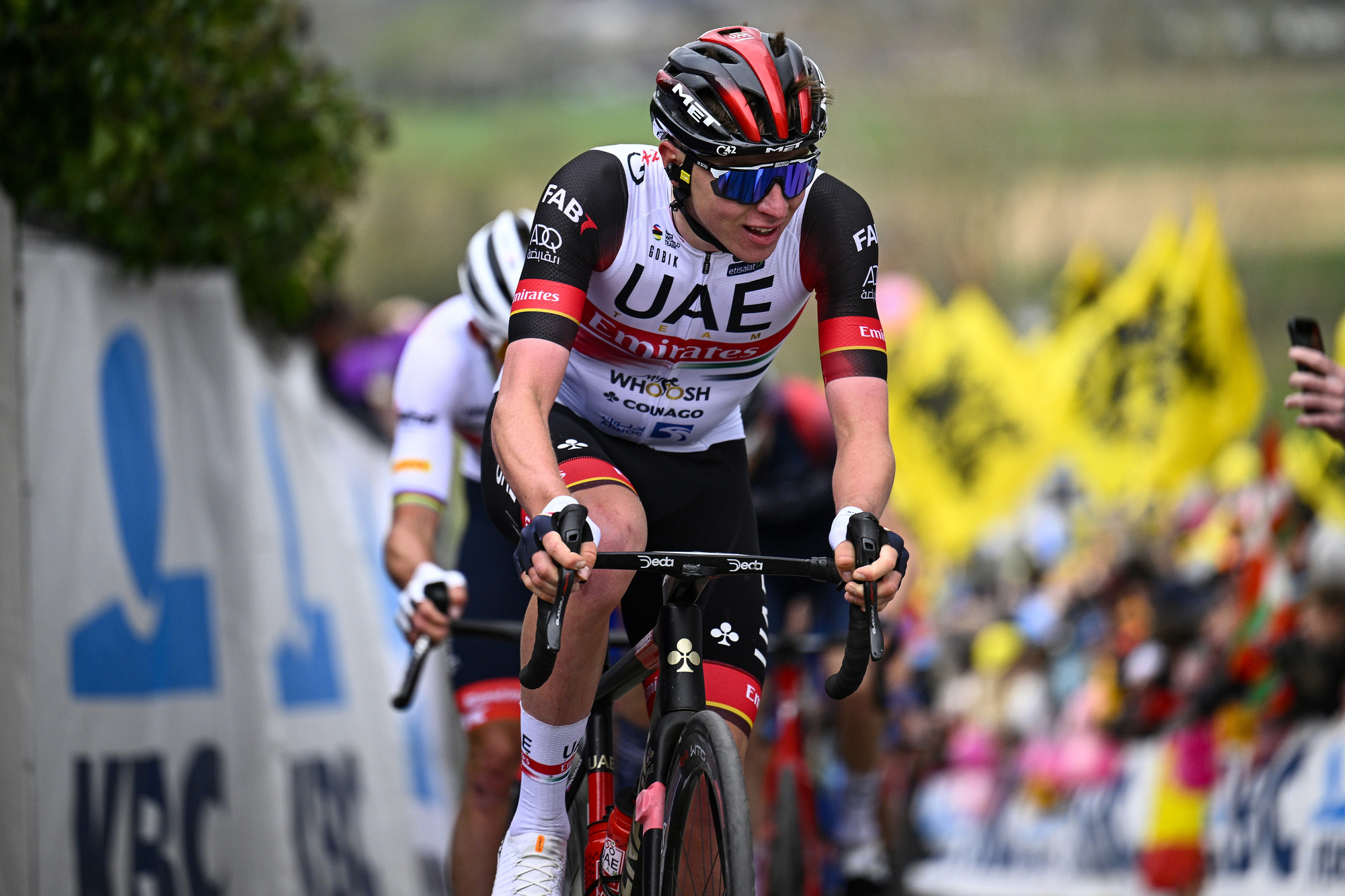
On consideration, it feels more than unfair to criticise Tadej Pogačar (UAE Team Emirates) for briefly throwing his toys out of the pram in the immediate aftermath of Sunday's finish of the Tour of Flanders. He had a lot to be annoyed about after all, even if, as UAE themselves confirmed later, no rules were broken in the five-way sprint (odd, as any sprint in those circumstances would be, but not irregular) that so visibly irritated Pogačar.
For one thing, there's the context to consider. It's often been observed that Pogačar handles the weight of expectation that lies on the shoulders of any double Tour de France winner with an impressively light touch. Yet it's always there and despite his total inexperience in Flanders, his jaw-droppingly successful strike rate in races of almost any kind meant no matter the result, his debut performance in the Ronde would always be studied and rated in a special class of its own.
And for Pogačar, just finishing Flanders would have been no small achievement in itself. After all no matter the result, bridging the previously-yawning gap between cobbled Classics and Grand Tour GC racing is always going to be to Pogačar's credit, just as it was, albeit overly briefly, to Alejandro Valverde's credit a few years back and for notably longer and in the opposite direction, to Geraint Thomas and Bradley Wiggins as well.
But instead Pogačar was arguably the strongest rider in the final crunch breakaway of five, and certainly the stand-out performer, as Fabian Cancellara sagely wrote in his Cyclingnews column, on each of the final climbs. And there Pogačar was too, fighting for victory to within less than 100 metres of the finish line. But finally, Pogačar ended up fluffing his lines for the first and last time in 270 kilometres (and despite an early crash, let's not forget), just when it mattered the most.
Get The Leadout Newsletter
The latest race content, interviews, features, reviews and expert buying guides, direct to your inbox!
Fourth in your first-ever Ronde van Vlaanderen is no disgrace in anyone's book. Pogačar had already way exceeded expectations. But in any case, Pogačar's blunder and his minor hissy-fit that followed, was a timely reminder just because he makes winning look so easy at times, even a rider as accomplished as Pogačar can drop the ball on occasion. But long-term, those human errors of judgement surely only make his wins seem even more impressive. (AF)
Kopecky, SD Worx - a textbook victory
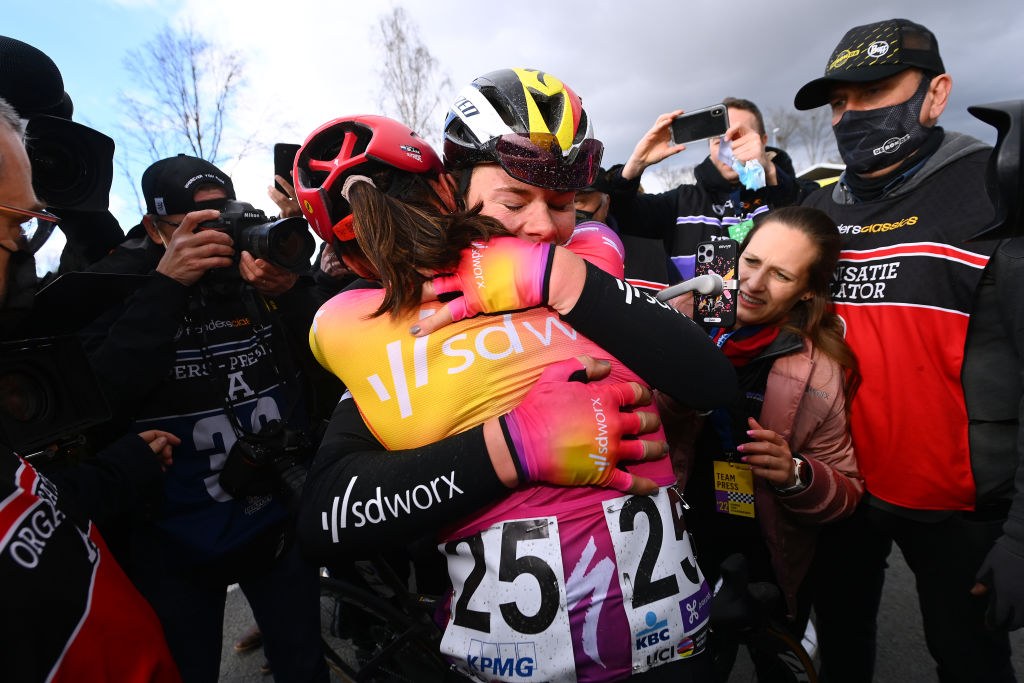
Lotte Kopecky sought out her teammate Chantal van den Broek-Blaak immediately following her remarkable victory on home soil at the Tour of Flanders. "Where is Chantal? Where is Chantal?" she repeated as she got off her bike, searching for her SD Worx teammate.
"Thank you, Chantal," were her following words expressed while embracing Van den Broek-Blaak as the photographers and journalists swarmed around them to capture the emotional moment.
SD Worx team, including Marlen Reusser, Demi Volleriing, Christine Majerus, and Elena Cecchini, played critical roles in Kopecky's victory. There was rarely a moment that they didn't have control over the race, and they finished with three riders in the top 5, showing their absolute dominance.
"Thank you to everybody on the team," Kopecky said.
Annemiek van Vleuten (Movistar) relentlessly attacked on the Koppenberg, Oude Kwaremont, and Paterberg, all the likely places, but she was unable to distance the powerful SD Worx team.
Still, it was Van den Broek-Blaak's final attack that resulted in the winning, late-race breakaway that included herself, Van Vleuten and Kopecky.
"It was a Blaak moment, indeed. This was the decisive move for the victory," Van den Broek-Black said. "When the connection came, I looked back and saw that only Annemiek van Vleuten and Lotte Kopecky were still in my wheel. Then I quickly changed gears, because Lotte is the fastest of the two of us. So I rode myself empty for her, so we stayed in front. The whole Team SD Worx was so strong today. This was the perfect team performance, from the textbook."
In the final, Van den Broek-Blaak led the trio into the final kilometre and up the righthand side of the road on the finishing straightaway. Van Vleuten launched her sprint first but was no match for the much faster Kopecky.
Ahead of the Tour of Flanders, Kopecky warned that much like her victory at Strade Bianche, where she also beat Van Vleuten, "if it takes the six of us to tire Annemiek van Vleuten, and if that's how we can win, that is what we will do." Indeed, SD Worx played to their strength in numbers and came out on top. (KF)
QuickStep's spring recruitment question marks
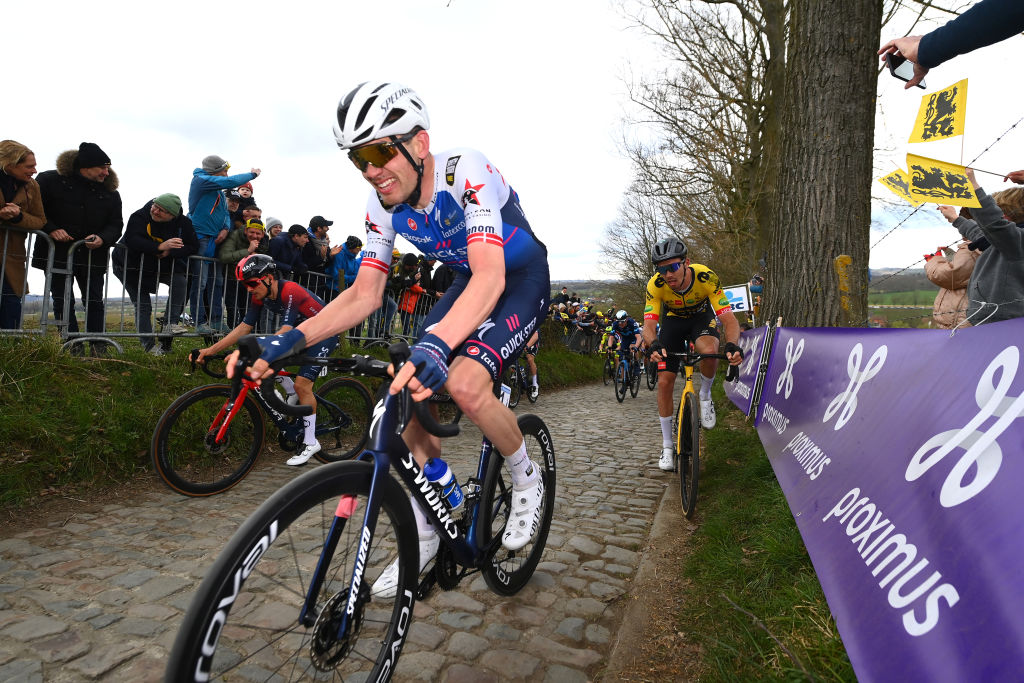
For years, QuickStep-AlphaVinyl's cobbled Classics unit seemed to recruit along the lines of Bill Belichick's New England Patriots. Rather than blow his budget on big splashes in the transfer market, Patrick Lefevere preferred to look for value in free agency. Riders like Niki Terpstra, Bob Jungels, and Philippe Gilbert would come in on competitive deals and contribute richly to the team' successes, before eventually moving on to bigger contracts elsewhere.
Almost counter-intuitively, that turnover helped to create the team's self-styled 'Wolfpack' image. Whenever a leading rider in the Classics department left, it seemed another would emerge and seamlessly take his place. When Julian Alaphilippe absented himself from the cobbles this year, it was easy to assume that he would simply be replaced from within the ranks.
Instead, this spring has exposed the unexpected gaps in QuickStep's roster. With illness limiting Yves Lampaert and Zdenek Stybar, the Classics squad was suddenly threadbare. For the first time since Tom Boonen's absolute zenith, the team entered the Ronde with a lone leader in Kasper Asgreen. The Dane caught the eye by following Tadej Pogačar on the second ascent of the Oude Kwaremont, but he paid for that effort, also suffering a mechanical, and could only manage 23rd place. It was QuickStep's worst-ever Tour of Flanders finish, and the pressure to put things right at Paris-Roubaix has never been greater.
QuickStep's intake of riders has been minimal in recent seasons, with Lefevere preferring to consolidate what he had rather than speculate in the transfer market. Alaphilippe and Remco Evenepoel were duly tied to lucrative and lengthy contracts. Recent investment has been in climbers rather than Classics specialists as the team looks to build its future around Evenepoel's still unknown potential in the Grand Tours.
That strategy makes commercial sense, given that it has helped to deliver sponsors – Soudal will join next year – and thus guarantee the team's survival for years to come. But in the here and now, QuickStep have been left short of depth in the races that have traditionally been their bread and butter. Securing the team's long-term future, in other words, has come at a short-term cost on the cobbles. Lefevere, an accountant by training, will no doubt look to balance those books by next Spring. (BR)
Movistar outgunned by SD Worx
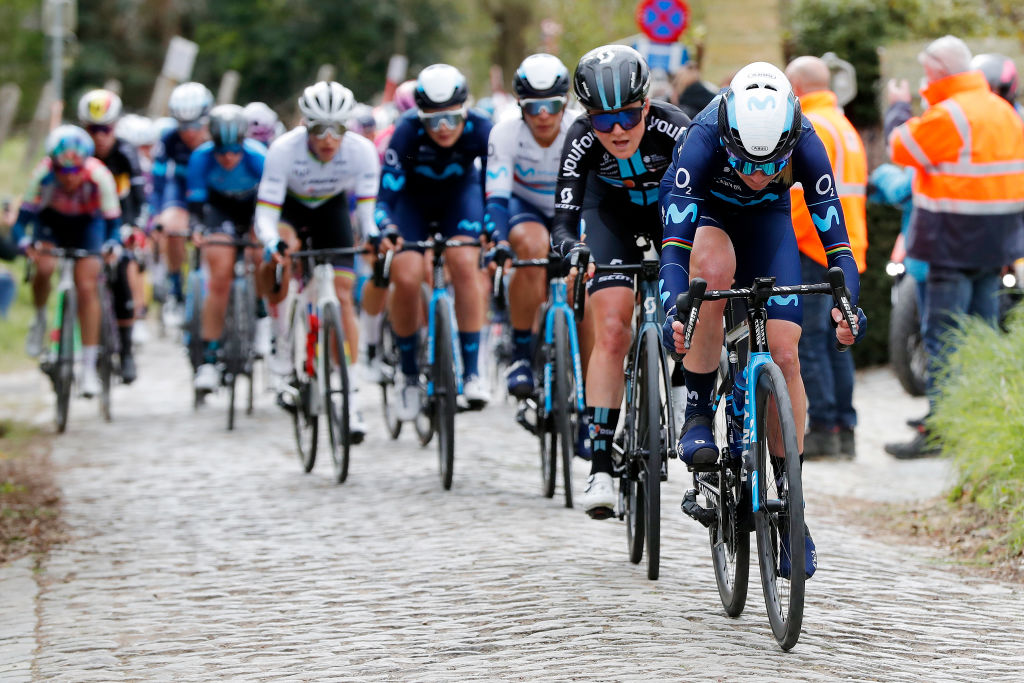
Defending champion Annemiek van Vleuten said after Sunday’s Tour of Flanders that she ran out of options, which left the Movistar rider in the shadow of winner Lotte Kopecky (Team SD Worx). Or was it that Movistar didn’t refocus on support for Arlenis Sierra?
The Cuban rider is in her first year with Movistar, having raced five years at the Continental level, but she’s been a formidable racer for several years, having finished second twice at the Cadel Evans Great Ocean Road Race (2020, 2019) and taking fifth at the UCI Road World Championships in Flanders last year. Sierra finished fourth on Sunday, her best placing at the Tour of Flanders, but in hindsight perhaps Movistar could have matched the Team SD Worx numbers more at the end, by shifting their tactics to work for Sierra.
After Van Vleuten accelerated on the Koppenberg to cut into the advantage of the breakaway with 45 kilometres to go, it was Sierra who launched an attack with 33km remaining to cause another disruption in proceedings. That move allowed Van Vleuten to attack on the Kruisberg/Hotond. However, it was the past champion who noted that when she attacked again on the Paterberg and then chased a counter-attack by Chantal van den Broek-Blaak, she did not realize that Kopecky clung to her back wheel. It was from that position that Kopecky struck out for the sprint victory.
"I actually didn't look back. I only saw Chantal in front and thought 'I cannot let her go', so my only mission was to go and get her,” Van Vleuten said later. “And then I was surprised that there were three of us.
"We arrived at the Koppenberg with too large a bunch for my taste. The climbs here are so short that I need a super-hard race to be able to drop riders like Lotte Kopecky on the Paterberg. Last year I was sometimes alone in front, and now I had two other cards to play with Arlenis Sierra and Emma Norsgaard. My team did a perfect job in the lead-out into the Koppenberg.”
Movistar is more than Van Vleuten this year and should not be afraid to shift tactics, as the race was not clearly won on the Koppenberg. (JBT)
Tactics, not pure power, win Van der Poel his second Flanders
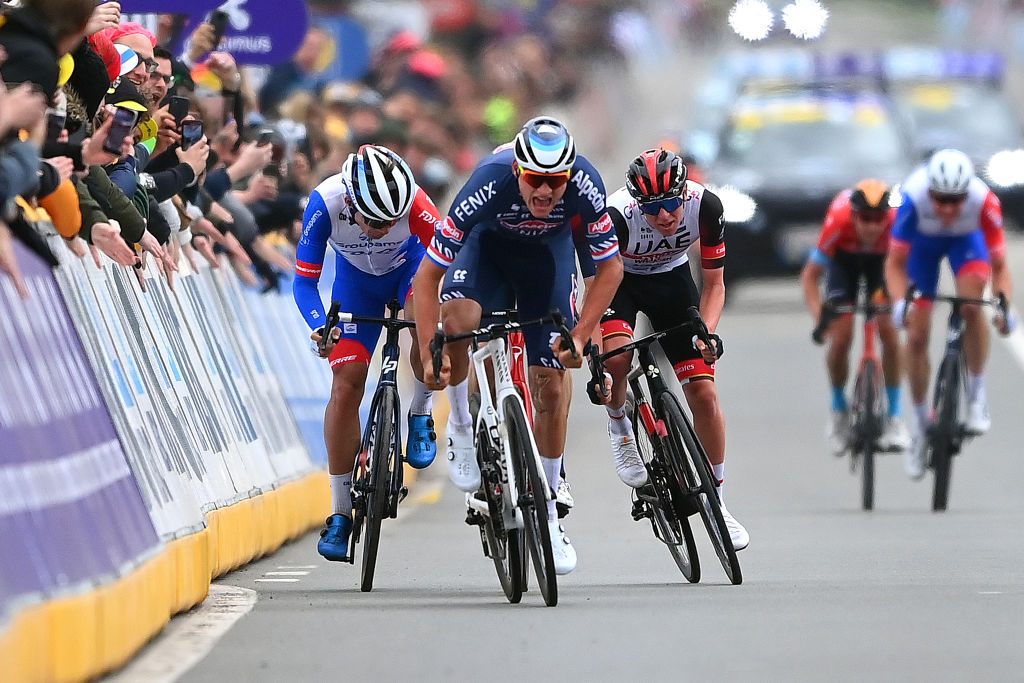
Mathieu van der Poel secured career victory number two at the Tour of Flanders on Sunday to continue a glittering run at the race in just four appearances. This time, however, his success came in contrast to his previous rides at the race, where his sheer power and strength were perhaps more evident.
The Dutchman was among the top two strongest men in the race, that much is clear, but on the closing climbs of the Oude Kwaremont and Paterberg, onlookers witnessed the rare sight of a Van der Poel on the back foot, forced to follow.
As what turned into the race-winning move went on the Koppenberg, it was Tadej Pogačar who led the way at the front, with the scene repeating itself on the Taaienberg, Oude Kwaremont, and finally the Paterberg, where Van der Poel briefly looked in real trouble.
Sunday's race was perhaps the first time where Van der Poel wasn't the outright strongest man at the Tour of Flanders, but he still managed to turn it to his advantage at the finish.
He led Pogačar into the closing metres, playing a cat-and-mouse game and slowing the race almost to a standstill as the chasers caught back on. It was a high-risk move, but Van der Poel seemed to be in total control for the first time during the race, executing his finishing tactics perfectly to get the beating of the only man who had looked stronger than him all day. (DO)
Chapman makes it a top 10 trio for FDJ
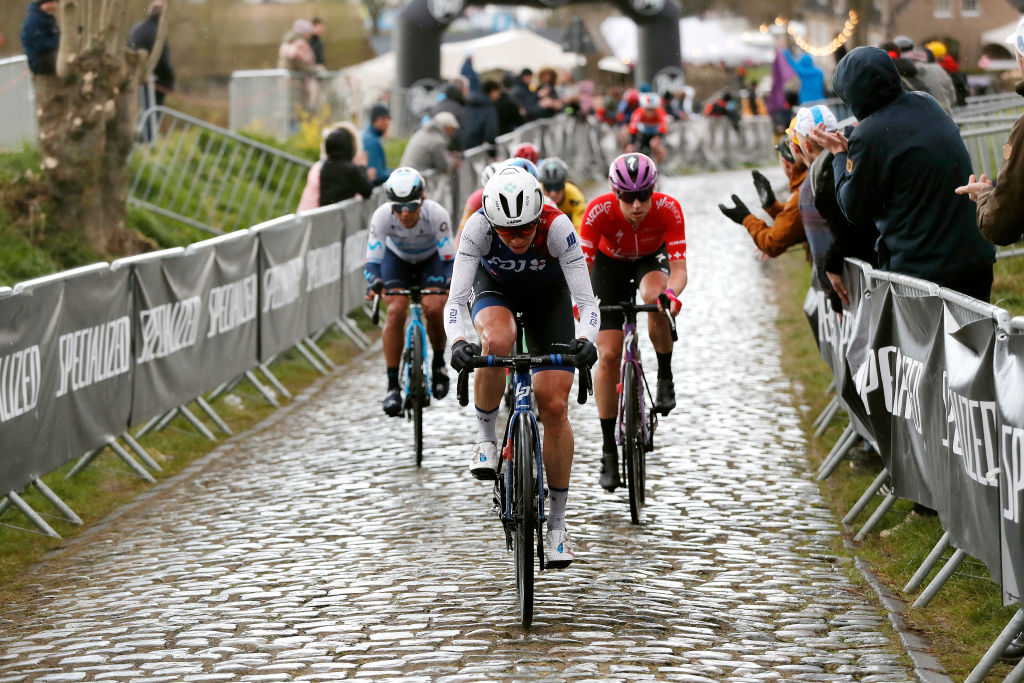
SD Worx was clearly the dominant team at the race but there was one other team that managed to place three riders in the top 10. It wasn’t regular contender Trek-Segafredo, who were even a surprise absence from the top 20, but a trio from FDJ-Nouvelle Aquitaine-Futuroscope.
Cecilie Uttrup Ludwig came sixth while Grace Brown was seventh – neither being unfamiliar faces at the front of the Ronde van Vlaanderen field as both having stepped on the podium at the race. There was, however, a new force evident on the cobbles for the French team, and that was Brodie Chapman.
What’s more it's the second time this week the 30-year-old Australian has made a mark. The rider, who is all to familiar with less than smooth riding surfaces, dropped hints of her form and skill on the cobbles at Dwaars door Vlaanderen but by the time she got to Ronde van Vlaanderen it was as obvious a flashing neon light on a moonless night.
Playing a role in the early breaks Chapman finished 28th at the mid-week race, after getting caught within 10km of the line after striking out in multiple breaks, with a long solo also thrown into the mix.
That remarkable display of endurance just continued at the Tour of Flanders, with the rider in the breaks, accelerating adeptly to the front on a wet slippery cobbled climb, chasing the powerhouse time trialler Marlen Reusser (SD Worx) and then when caught helped lead her teammates to the line and still managed to finish ninth.
When it comes to the cobbled classics, it now looks like FDJ have another potential podium contender on their hands. (SG)
Küng ready for Paris-Roubaix
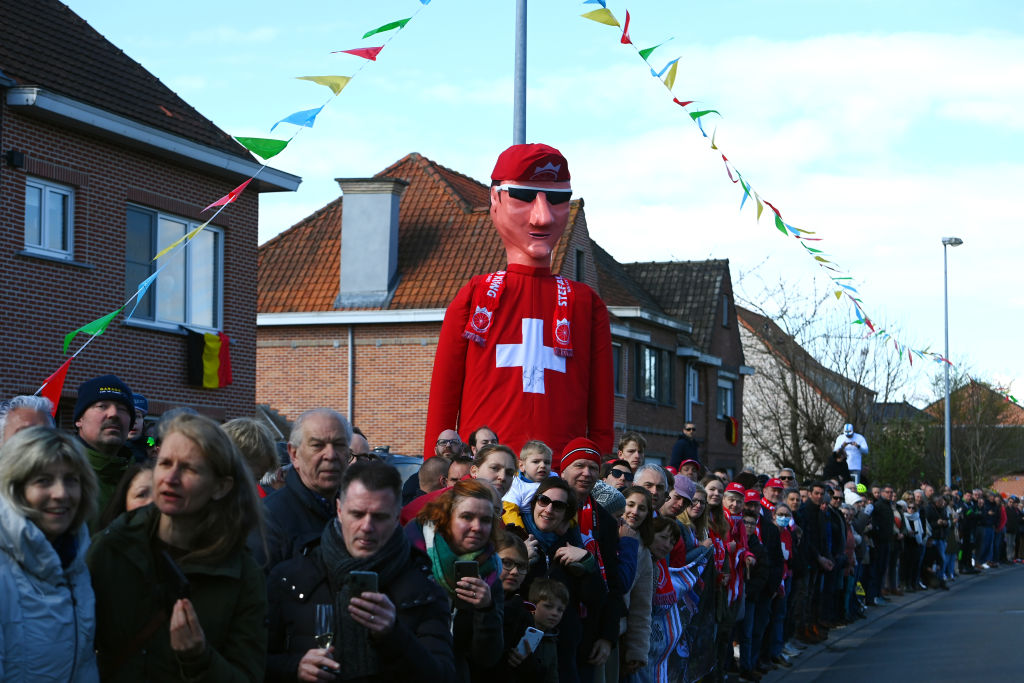
Stefan Küng’s expression was a mixture of dismay and disbelief at the finish of the time trial stage of the Volta ao Algarve in Tavira in February. The European champion in the discipline had just lost almost a minute to Remco Evenepoel (QuickStep-AlphaVinyl) in the space of 32km, and he must have wondered if his winter had been spent in vain.
Just 24 hours later, however, the Swiss rider was to the fore during the uphill finale at the Alto do Malhão, and his ease on that relatively inhospitable terrain was, in hindsight, a sign that he was on track for the Spring. Confirmation followed with an aggressive showing at Omloop Het Nieuwsblad and another assured climbing display on the breathless final stage of Paris-Nice.
That form has continued on the cobbles ever since. After placing third at the E3 Saxo Bank Classic, Küng helped to drive the long, long winning move at Dwars door Vlaanderen (sixth) and he was again to the fore at the Tour of Flanders, placing fifth, just two seconds down on Van der Poel.
After emerging as the strongman from the chasing group on the final lap over the Kwaremont and Paterberg, Küng was reluctant to contribute too heartily to the pursuit of the leaders on the run-in to Oudenaarde, given that his teammate Valentin Madouas (third) was still ahead. He finished the day in sight of the sprint for victory, but not a part of it, and he confessed to some regrets afterwards. “When you see that final stretch, you think ‘ah maybe everything would have been possible'…” said Küng.
No matter, Küng has begun to deliver consistently on his promise on the cobbles this Spring after years of gradual progression, and the Classic that tallies best with his qualities as a rouleur is two week away. Van der Poel is the obvious favourite for Paris-Roubaix, but with Wout van Aert (Jumbo-Visma) recovering from COVID-19 and QuickStep shy of their usual best, Küng is much more than an outsider. (BR)
Balsamo's winning streak ends, Vos disappointed
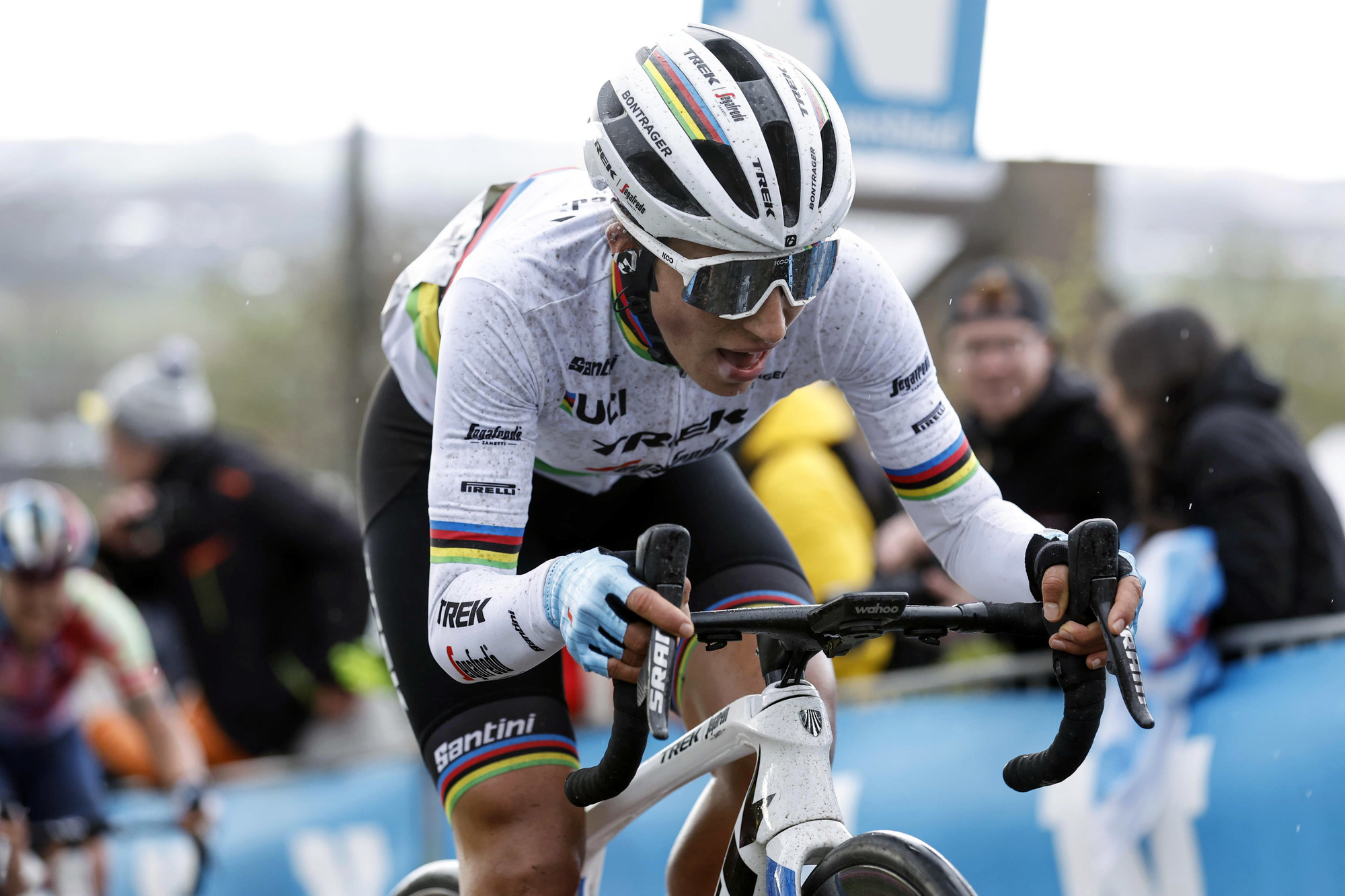
Trek-Segafredo and Jumbo-Visma were two of the heavy-hitting teams on the start line at the women’s Tour of Flanders. However, the race crested the last two ascents of the Oude Kwaremont and Patterberg, their star riders, Elisa Balsamo and Marianne Vos, were out of contention in the final kilometres of the race into Oudenaarde.
Trek-Segafredo entered with Balsamo as the favourite after winning three back-to-back races Brugge-De Panne, Trofeo Alfredo Binda and Gent-Wevelgem. At the Tour of Flanders, the Italian was supported by a team of former event winners Elisa Longo Borghini and Ellen van Dijk to try and secure a fourth straight victory.
Longo Borghini confirmed ahead of the race that she struggled with a sinus infection and would not be the team leader at Flanders. Questions swirled as to whether Balsamo was suited to the more demanding parcours, including the Koppenberg, Oude Kwaremont and Paterberg. Still, she insisted that she would fight to survive such challenges.
Unable to hang on to Annemiek van Vleuten’s attacks over the Koppenberg and the Oude Kwaremont, Balsamo was distanced from the selection and finished 28th, 1:13 behind the day’s winner Lotte Kopecky, and the highest-placed rider for Trek-Segafredo.
A fourth straight victory was, in the end, not in the cards for Balsamo in what the team called a “cold and punishing” Tour of Flanders, but that they “gave everything in trying.”
Vos had one remaining Jumbo-Visma teammate in the final 30km, Anna Henderson, who used her strengths to join decisive late-race breakaways. Caught over the Oude Kwaremont, Henderson drifted back to support Vos, who finished among the third group in 20th place.
Vos said she was disappointed but honest about her performance at the Tour of Flanders. “I have felt better after a race. Today I just wasn’t good enough. I couldn’t keep up.” (KF)
A winning crowd for Kopecky
Celebrations for Lotte Kopecky 😍🍾 pic.twitter.com/MK8o3Y0z7iApril 3, 2022
Two years of the Tour of Flanders without crowds, and the legions of fans that lined the roads appeared to be making up for lost time. Flags adorned with the Flemish lion awaited the riders as they went up the cobbled climbs, along with roars from the crowd of rugged up fans leaning over the barriers straining to see if their favourite was leading the line of approaching riders. Then it was a raucous welcome as they headed toward the line where it looked like three years of celebrations rolled into one.
That was particularly the case when, in a fitting finale, it was Lotte Kopecky that sprinted first over the line delivering not just an exciting finish, but a home-nation winner and – even better – one clad in the black, yellow and red clad jersey of the national champion. The Belgian winner that failed to materialise at the World Championships had arrived and the excitement bubbled over.
The anticipation of Kopecky, the first Belgian women to win the Tour of Flanders in 12 years, coming out on the podium was enough to work the crowd up into a frenzy. It was loud before she even appeared, with the volume of the roar going into overdrive as she appeared, fans jumping up and down, pumping their fists in excitement.
The waves of cheers kept coming as she lifted the trophy aloft and as she went to speak – first having to wait for the noise to die down so she could be heard – and then the sing song chants began.
The shared elation of the crowd kept coming in waves, and no doubt it continued far beyond the podium presentations and well into the night. It may have been a win for Kopecky, a win for SD Worx, but most of all it felt like a win for the crowd. (SG)
The cobbled Classics head into extra time
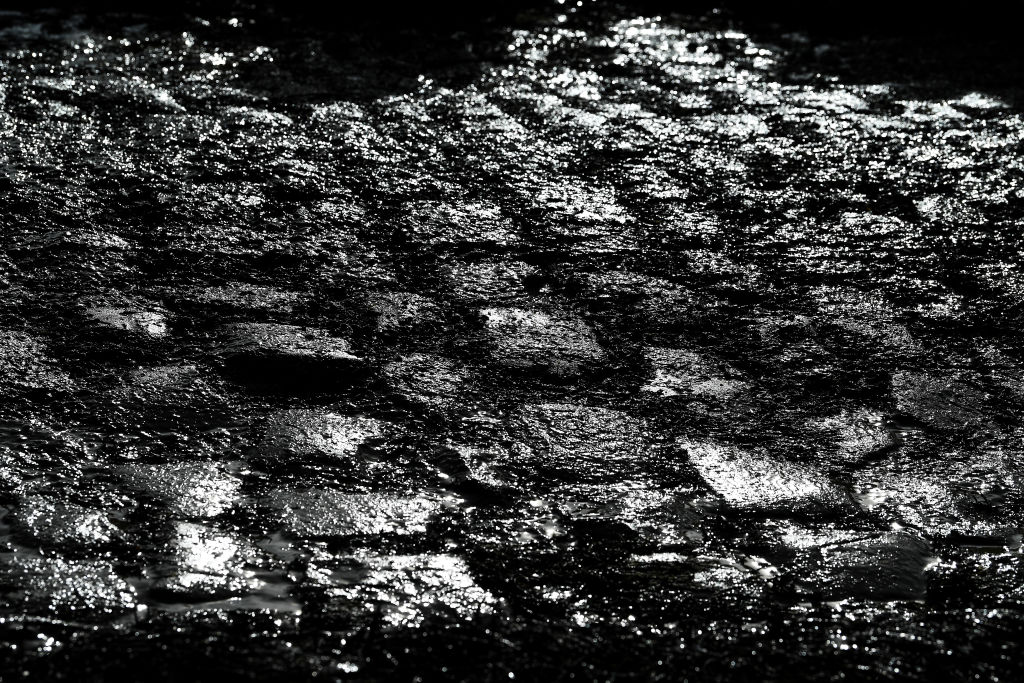
From the Tour of Flanders to the smallest Junior event, one of the major perennial attractions of any Classic is there are rarely any second chances on the day itself and it's only when all the planets line up exactly that you can get a look-in on winning.
However, another huge plus point of the Classics is that opportunities for revenge matches are never lacking, and this year, the extra week's wait for Paris-Roubaix will only further boost its well-established status as a massive chance for disappointment in the Ronde van Vlaanderen to morph into a major cobbled Classic triumph, just a little further south.
Ironically enough given the delay on the pavé is to avoid a clash with the first round of the French presidential elections, it's most non-French racers who will or could benefit from the extra wait. It's yet to be seen if Wout van Aert (Jumbo-Visma), prior to Friday the outright Flanders favourite, will be back in action after falling foul of COVID-19. But his symptoms are thankfully mild so far, and another seven days will surely do no harm to his chances.
It's a similar story for former Paris-Roubaix winner Peter Sagan (TotalEnergies), currently on the hunt to see if he can ascertain what went wrong with his pre-Flanders (and pre-Classics) build-up. Given previous speculation after spells without winning, a Sagan comeback at Roubaix surely can't be ruled out.
While EF Education-EasyPost were nowhere to be seen at Flanders due to illness and injury, the entire Israel-Premier Tech cobbled Classics squad will doubtless be glad of the extra time. Two COVID-19 cases last week left Sep Vanmarcke and the rest of the squad on the benches for Flanders and next week's Scheldeprijs, but Roubaix remains a target.
As for those who did race Flanders, Tadej Pogačar, arguably one of the most disappointed men on Sunday evening in Oudenaarde after such a near-miss, will not be among those gathering in Compiègne's central square a week next Sunday. But Tom Pidcock (Ineos Grenadiers), a promising third in Dwars Door Vlaanderen, will be looking for a chance to shine more brightly than he could in Flanders with a teammate, Dylan van Baarle, up the road.
And if Quick Step's greatest cobbled Classics star, Tom Boonen, salvaged his own season in 2008 at Roubaix rather than the team (already the winner at Flanders with Stijn Devolder the week before), this time the collective pressure on Patrick Lefevere's squad is arguably even higher.
At the other end of the age spectrum, former winner Greg Van Avermaet (AG2R Citroën) will be aiming to revive a Classics campaign that started better than expected in Het Nieuwsblad but has spiralled into anonymous top 20 finishes since then. And as the cobbled Classics goes into extra time, there are plenty of others whose birthdates fall between these two looking to set the Flanders record straight in Roubaix. (AF)

Simone is a degree-qualified journalist that has accumulated decades of wide-ranging experience while working across a variety of leading media organisations. She joined Cyclingnews as a Production Editor at the start of the 2021 season and has now moved into the role of Australia Editor. Previously she worked as a freelance writer, Australian Editor at Ella CyclingTips and as a correspondent for Reuters and Bloomberg. Cycling was initially purely a leisure pursuit for Simone, who started out as a business journalist, but in 2015 her career focus also shifted to the sport.